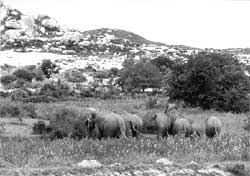Poisoned again
 conflicts with human beings have recently taken toll on 18 elephants in Nameri National Park, Assam, the state which houses half of India's elephant population. What was first believed to be a disease killing, later turned out to be a case of poisoning. The crisis, which is also said to have spread to the adjacent Pakhoi Wildlife Sanctuary in Arunachal Pradesh, is perhaps one of the many instances of human-animal conflict.
conflicts with human beings have recently taken toll on 18 elephants in Nameri National Park, Assam, the state which houses half of India's elephant population. What was first believed to be a disease killing, later turned out to be a case of poisoning. The crisis, which is also said to have spread to the adjacent Pakhoi Wildlife Sanctuary in Arunachal Pradesh, is perhaps one of the many instances of human-animal conflict.
The forest authorities of Assam, however, put the number of deaths to ten. According to a senior forest department official in Guwahati, nine elephants died in July-August and the 10th elephant died on September 10. With the death of the first few elephants, there was a lot of speculation that the elephants might have died due to anthrax. Later the theory of liver fluke was also propped up.
However, when the college of veterinary sciences in Guwahati conducted tests on the animals, they found traces of a pesticide called Demecron in all nine elephants. This is now believed to be the cause of the deaths although investigations are still on. According to experts, this is a clear case of deliberate poisoning of the pachyderms by the villagers around the park in retaliation against the destruction of their crops and property, and sometimes lives, by the elephants.
"There is a large human population around the park and it is possible that these elephants were poisoned by the villagers,' says a forest official. One interesting aspect is that most of the carcasses were found near the waterbodies. According to Bibhab Talukdar, conservationist and secretary of Aranyak, a Guwahati-based non-governmental organisation, the disease factor can be further refuted by the fact that after the carcasses were found and people became alert, there seem to be no further deaths. He adds that some villagers near the park admitted to have poisoned a rivulet for fishing purposes. No arrests, however, have been made.
Experts are of the opinion that this kind of an incident was inevitable given the conditions of the elephant habitat not only in Nameri, but all over the country. "The habitat is shrinking and people encroaching from all sides. This increases the conflicts and the compensations are also not very much,' says Talukdar.
The compensation for death or permanent incapacitation is Rs 20,000 and there are no compensations for destruction of crop or property. Given such conditions, it is not surprising that irate villagers would like to live with as few elephants as they could, say experts.
